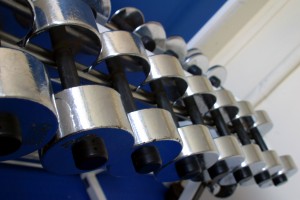RESISTANCE TRAINING: THE WOE OF ENDURANCE ATHLETES
Triathletes and other endurance sports athletes are notorious for not incorporating some form of resistance training into their training programs. Some think training with weights and other forms of resistance will make them bulky, clunky, and slow. Others may think they do not have the time to resistance train on top of their swim, bike, and run schedules. Some people are scared of weights and some people just plain don’t want to.
This is unfortunate because having an appropriate resistance training program can drastically enhance performance, decrease fatigue, decrease injury, and speed up recovery time.
Lengthy endurance training sessions take a toll on the body, especially long runs. Performing the same pounding movement in a straight line, day-in and day-out, will weaken muscles not in use during the movement and tighten the muscles and tendons that are being used.
The benefits of resistance training FAR outweigh any excuse not to.
But won’t this type of training make me big and clunky?
 No.
No.
The main goal for body builders when they train is muscle hypertrophy (size), not strength and power. Strength may be a byproduct of the size, but that is not the main goal. They achieve size by lifting a certain way, eating enough food to sustain their bulk, and little to no cardio. It takes a lot of work to hold onto size like that, so if you are not intentionally trying to gain bulk, you probably won’t unless you are a genetic muscle freak.
Triathletes should train for strength and power. Again, this will enable an individual to sustain effort for longer periods of time delaying fatigue, increase “kick” during the race, decrease risk of injury, and increase performance overall. Proper strength training will get you the power, speed, and strength you need without a substantial gain in body mass.
I just don’t have the time to resistance train. ..
..
Resistance training can be just as beneficial for race performance as actual swim, bike, and run training.
In terms of a car, if you upgrade the engine without upgrading other parts within the car, it is only a matter of time before something breaks down. The same goes for your body. Resistance training is like strengthening all moving parts within a vehicle…then putting a supercharger on the engine. You will see results beyond just driving (running) around for hours. Plus if something breaks down, it will take up more time just to get back to where you were before.
A triathlete would not quit running because they didn’t have enough time. When you put resistance training on equal grounds with the other three events, it will be easier to prioritize and schedule your workouts.
Marathon resistance training sessions will not do you any good. 20 – 30 minutes two to three times per week will make a HUGE difference.
I’m too weak to resistance train…
 Exactly. All the more reason to do it.
Exactly. All the more reason to do it.
Any resistance training program should be scaled to the capabilities of the individual. If you can’t do a squat now, there are other things you can do to build up to it. Fear should never be a factor in stopping you from resistance training.
I don’t even know where to begin…
Not a problem. There are many books and resources on the Internet out there that can help you, but you should always beware of false information from unverified sources. Even better, you can get a personal trainer that can help you create a program based on your own abilities and goals and have someone to hold you accountable and teach you proper technique.
You should always consult a professional before starting a resistance training routine. Done with improper form, this type of training can do more harm than good. You wouldn’t run with your body bent over and contorted into a weird position, so don’t resistance train in an improper position either.
A USAT certified Triathica coach can help you get on the right track with resistance training. Schedule a personal training session here.


